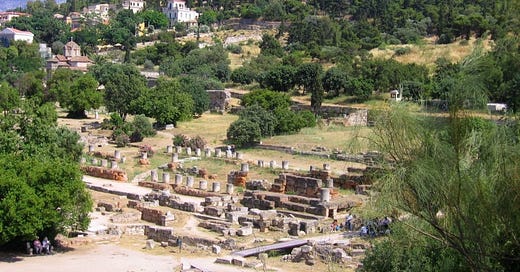The Roman emperor, and Stoic philosopher, Marcus Aurelius wrote in his personal notes on Stoic philosophy:
A fine reflection from Plato. One who would converse about human beings should look on all things earthly as though from some point far above, upon herds, armies, and agriculture, marriages and divorces, births and deaths, the clamour of law courts, deserted wastes, alien peoples of every kind, festivals, lamentations, and markets [agoras], this intermixture of everything and ordered combination of opposites. — Meditations, 7. 48
This looks like it’s intended as a quote from Socrates in Plato’s writings but, incidentally, it doesn’t appear in any of the surviving Platonic dialogues.
In this and other passages, it’s clear that Marcus is describing a mental exercise — he tells himself to regularly picture such scenes. The French scholar Pierre Hadot coined the name the “View from Above” for this sort of contemplative practice, which appears in many ancient sources — not only the Stoics.
Sometimes it’s tempting to imagine that what’s being described is like the viewpoint of Zeus, or the other gods, atop Mount Olympus, as they look down on mortal affairs below. Indeed, the practice of trying to expand one’s mind by imagining the perspective of a god was a common contemplative exercise in the ancient world and could take several other forms. However, one day a more obvious analogy dawned on me.
I was reading this passage from The Meditations on the Pnyx hill, wondering whether it truly came from Plato or even Socrates. I looked up for a moment at the Acropolis in front of me and suddenly realized that I could almost be reading a description of the view from the Acropolis, where the ruins of the Parthenon, an ancient temple to Athena is located. The word “Acropolis”, in ancient Greek, literally meant “highest part of the city”. It refers to the hill in the centre of Athens that overlooks the ancient agora, the city centre and marketplace. (Indeed, in the passage above, Marcus uses the word agora, translated “marketplace”.)
There are several other passages in The Meditations that appear to relate to the same contemplative practice. For example:
You should always keep these three thoughts at hand… if you were suddenly raised aloft and looked on human affairs from above in all their diversity, with what contempt [or rather indifference] you would view them, seeing at the same time what a host of beings live all around in the air and the ether, and that however often you were raised aloft, you would behold the same things, ever unvarying, ever as short-lived — and it is in these that you set your pride! — Meditations, 12.24
However, in another well-known passage, Marcus actually employs the word acropolis:
Remember that your ruling centre becomes invincible when it withdraws into itself and rests content with itself, doing nothing other than what it wishes, even where its refusal to act is not reasonably based; and how much more contented it will be, then, when it founds its decision on reason and careful reflection. By virtue of this, an intelligence free from passions is a mighty citadel [acropolis]; for man has no stronghold more secure to which he can retreat to remain unassailable from that time onward. One who has failed to see this is merely ignorant, but one who has seen it and fails to take refuge there is beyond the aid of fortune. — Meditations, 8.48
Typical translations of akropolis as “citadel”, etc., obscure the fact that the original Greek implies a high-up place, akin to the “some point far above” mentioned by Marcus in passage 7.48, quoted earlier .
Combining these passages, therefore, a description emerges of the ideal Stoic mind-set as resembling, in Marcus’ own words, an acropolis, high above, looking down on the hustle and bustle of an agora.
Neostoicism
In the sixteenth century, the Neostoic Justus Lipsius actually told the following story about Solon, one of the “seven sages”, which is set in a high tower, presumably on one of the hills, overlooking Athens, quite possibly the Acropolis.
Solon, seeing a very friend of his at Athens mourning piteously, brought him into a high tower and showed him underneath all the houses in that great city, saying to him “Think with yourself how many sundry mournings in times past have been in all these houses, how many at this present are, and in time to come shall be; and leave off to bewail the miseries of mortal folk, as if they were your own.”
Lipsius’ friend advises him to imagine a similarly broad perspective on events, not by literally climbing a hill but by using his imagination to place himself atop Mount Olympus.
I would wish you, Lipsius, to do the like in this wide world. But because you cannot in deed and fact go to, do it a little while in conceit and imagination. Suppose, if it please, that you are with me on the top of that high hill Olympus; behold from there all towns, provinces, and kingdoms of the world, and think that you see even so many enclosures full of human calamities. These are but only theatres and places for the purpose prepared, in which Fortune plays her bloody tragedies.
He is to continually remind himself of the “View from Above” in order to alleviate his distress, but also to remind himself of his own mortality.
Which things think well upon, Lipsius, and by this communication or participation of miseries, lighten your own. And like they [Roman generals] which rode gloriously in triumph, had a servant behind their backs who in the midst of all their triumphant jollity cried out often times “you are a man” [and “remember you must die”], so let this be ever as a prompter by your side, that these things are human, or appertaining to men. For as labour being divided between many is easy, even so likewise is sorrow.
The “View from Above” was a particularly familiar concept to ancient Athenians. This elevated, serene, and somewhat detached perspective on the agora where goods were sold and other important business conducted was the view from the sacred Acropolis in the middle of their city, and from other nearby vantage points on high ground.







Lucretius has a similar quote
"It is pleasant to look down upon the numberless hordes of mankind feverishly coming and going,
fighting, in angst, not out of derision but out of quietly contemplating mankind from a distance " Lucretius